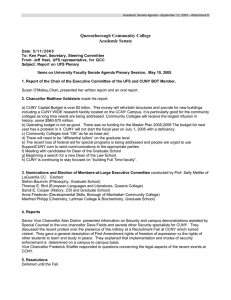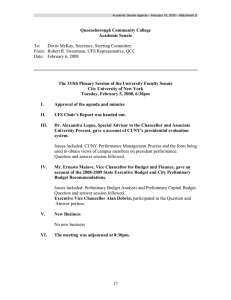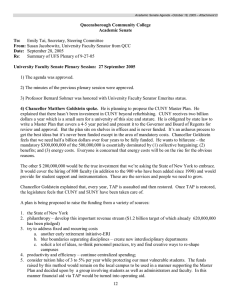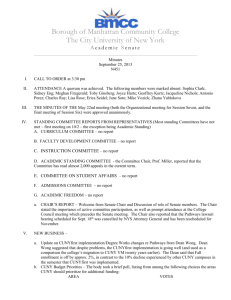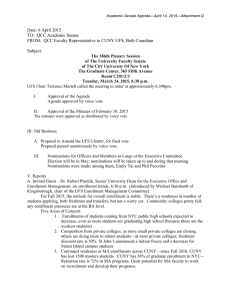Document 11132789
advertisement
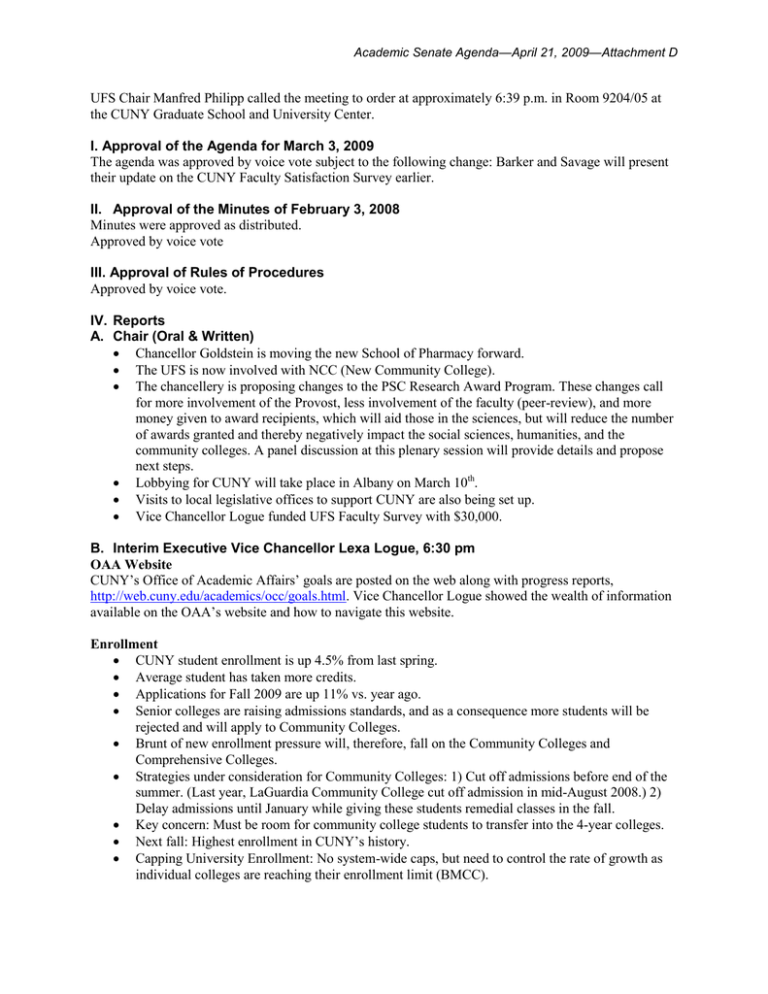
Academic Senate Agenda—April 21, 2009—Attachment D UFS Chair Manfred Philipp called the meeting to order at approximately 6:39 p.m. in Room 9204/05 at the CUNY Graduate School and University Center. I. Approval of the Agenda for March 3, 2009 The agenda was approved by voice vote subject to the following change: Barker and Savage will present their update on the CUNY Faculty Satisfaction Survey earlier. II. Approval of the Minutes of February 3, 2008 Minutes were approved as distributed. Approved by voice vote III. Approval of Rules of Procedures Approved by voice vote. IV. Reports A. Chair (Oral & Written) Chancellor Goldstein is moving the new School of Pharmacy forward. The UFS is now involved with NCC (New Community College). The chancellery is proposing changes to the PSC Research Award Program. These changes call for more involvement of the Provost, less involvement of the faculty (peer-review), and more money given to award recipients, which will aid those in the sciences, but will reduce the number of awards granted and thereby negatively impact the social sciences, humanities, and the community colleges. A panel discussion at this plenary session will provide details and propose next steps. Lobbying for CUNY will take place in Albany on March 10th. Visits to local legislative offices to support CUNY are also being set up. Vice Chancellor Logue funded UFS Faculty Survey with $30,000. B. Interim Executive Vice Chancellor Lexa Logue, 6:30 pm OAA Website CUNY’s Office of Academic Affairs’ goals are posted on the web along with progress reports, http://web.cuny.edu/academics/occ/goals.html. Vice Chancellor Logue showed the wealth of information available on the OAA’s website and how to navigate this website. Enrollment CUNY student enrollment is up 4.5% from last spring. Average student has taken more credits. Applications for Fall 2009 are up 11% vs. year ago. Senior colleges are raising admissions standards, and as a consequence more students will be rejected and will apply to Community Colleges. Brunt of new enrollment pressure will, therefore, fall on the Community Colleges and Comprehensive Colleges. Strategies under consideration for Community Colleges: 1) Cut off admissions before end of the summer. (Last year, LaGuardia Community College cut off admission in mid-August 2008.) 2) Delay admissions until January while giving these students remedial classes in the fall. Key concern: Must be room for community college students to transfer into the 4-year colleges. Next fall: Highest enrollment in CUNY’s history. Capping University Enrollment: No system-wide caps, but need to control the rate of growth as individual colleges are reaching their enrollment limit (BMCC). CUNY University Faculty Senate Plenary Session March 3, 2009 C. Faculty Experience Survey Update (Professors Baker and Savage) Response rates varied in last survey, which was conducted 2005, from 24.6% up to 48.2%. Survey development completed. Funded by Vice Chancellor Logue. Survey will be administered online. This discussion was based on costs. Concern about low response rate due to online modality. A series of postcards will be sent to faculty with information on how to complete the survey. Postcards will provide an informed consent statement, which guarantees respondent’s privacy of. Survey will include full-time and part-time faculty. Survey will be examined closely by CUNY. The higher response rate the more likely CUNY will consider the results. Results will be posted on the Internet. D. Panel Discussion of the PSC-CUNY Research Award Restructuring A panel discussion on the chancellery’s proposed restructuring of the PSC-CUNY Research Award was conducted with: Kathryn Richardson, Chair, UFS Research Committee Thomas Bird, UFS Research Committee William Divale, Chair of UCRA TF Cheryl Bluestone, UCRA Vice-Chair James Gordon, Chair UCRA TF, 2005 After reviewing the history, funding (the value of the grants has not kept pace with inflation), expenditures of this program, and the success of this program, the panel summed up the chancellery’s proposed changes to this program. Key features of the chancellery’s proposal: Bigger awards should be granted to fewer recipients. This will help applicants in the sciences at the expense of applicants in the humanities, social sciences, and those from community colleges. The chancellery’s proposals will enhance the power of the Provost while undermining the peerreview process that has been the backbone of the PSC-CUNY Research Awards. It is unclear that the chancellery’s proposals are legal or in agreement with the union contract as these grants are funded with faculty money and guided by CUNY’s contract with the PSC. At the next Plenary Session of the UFS, motions will be entertained on how to respond to the chancellery’s proposals. The meeting was adjourned at approximately 8:10 pm Attach-D-March09_UFSMinutes.doc Page 2
